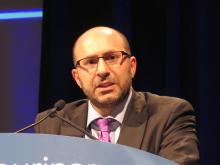SAN FRANCISCO – subgroup analyses of the JAVELIN Renal 101 trial have shown. Results were reported at the 2019 Genitourinary Cancers Symposium sponsored by the American Society of Clinical Oncology, ASTRO, and the Society of Urologic Oncology.
Previous research had shown that avelumab (Bavencio), an immune checkpoint inhibitor targeting programmed death-ligand 1 (PD-L1), is active when used alone for advanced RCC, noted lead investigator Toni K. Choueiri, MD, director of the Lank Center for Genitourinary Oncology at the Dana-Farber Cancer Institute, Boston. And axitinib (Inlyta), a vascular endothelial growth factor (VEGF) tyrosine kinase inhibitor, is approved for use in the second line. In an early-phase trial among patients being treated in the first line, a combination of the two drugs led to an impressive 58% objective response rate (ORR) and had a favorable safety profile (Lancet Oncol. 2018 Apr;19(4):451-60).
JAVELIN Renal 101 (NCT02684006), a phase 3 randomized, controlled trial, enrolled 886 patients with treatment-naive advanced RCC having a clear cell component regardless of their tumor’s PD-L1 status. They were randomized to the combination of avelumab/axitinib or to the VEGF tyrosine kinase inhibitor sunitinib (Sutent) alone.
Full trial results, published during the symposium in the New England Journal of Medicine (2019 Feb 16. doi: 10.1056/NEJMoa1816047), showed significant progression-free and overall survival benefits of avelumab/axitinib over sunitinib in the 63.2% of patients with PD-L1–positive tumors – the trial’s primary endpoints – as well as a progression-free survival benefit in the entire trial population.
In the subgroup analyses reported at the symposium, the combination reduced risk of progression or death by roughly 20%-50% across patients having different statuses in regard to International Metastatic Renal Cell Carcinoma Database Consortium (IMDC) risk group, Memorial Sloan Kettering Cancer Center (MSKCC) risk group, and tumor PD-L1, as well as other characteristics. Findings were similar for ORR, with the combination roughly doubling to quadrupling the odds of response, irrespective of patient and disease characteristics.
“The progression-free survival and response rate benefit was observed in all patients, regardless of PD-L1 status, regardless of prognostic risk group. At this time, the study continues to follow up for overall survival,” Dr. Choueiri commented. Taken together, “the results do support avelumab plus axitinib as a new first-line standard of care for patients with advanced RCC.”



